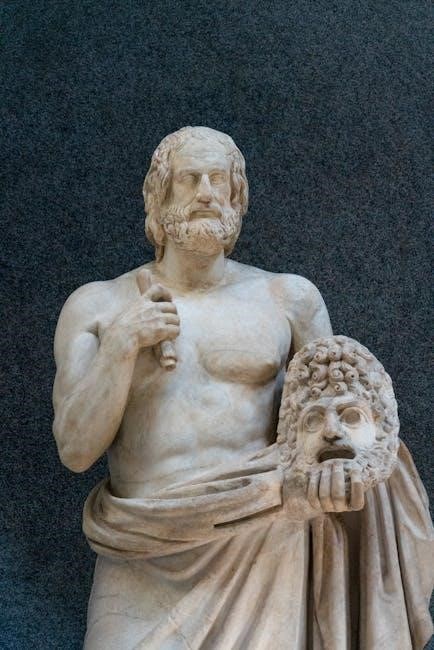
medea by euripides pdf
Medea, a powerful enchantress in Greek mythology, is renowned for aiding Jason in retrieving the Golden Fleece. As the daughter of King Aeëtes of Colchis, she possesses divine lineage and prophetic gifts. Euripides’ play portrays her as a tragic heroine, exploring themes of love, betrayal, and revenge, while delving into the conflict between reason and emotion, shaping her legacy in Western literature.
1.1 Background and Mythology
Medea, a figure in Greek mythology, is the daughter of King Aeëtes of Colchis and the granddaughter of the sun god Helios. Known for her extraordinary magical abilities and prophetic powers, she played a pivotal role in Jason’s quest for the Golden Fleece. Medea’s divine lineage and mastery of sorcery made her a crucial ally to Jason, enabling him to overcome the challenges set by her father. Her story is deeply intertwined with themes of love, betrayal, and revenge, as she ultimately flees Colchis with Jason, only to face abandonment and heartbreak. Medea’s mythology explores the complexities of her character, portraying her as both a powerful sorceress and a tragic figure caught in the turmoil of divine and human conflicts. Her narrative has become a cornerstone of ancient Greek mythology, shaping her enduring legacy in literature and art.
1.2 Euripides’ Adaptation
Euripides’ play Medea is a masterful adaptation of the myth, focusing on the tragic events following Jason’s betrayal. The drama explores Medea’s emotional turmoil as she grapples with abandonment and heartbreak. Euripides portrays her as a complex, multifaceted character, blending intelligence, passion, and ruthlessness. The play delves into themes of love, revenge, and the clash between reason and emotion, highlighting Medea’s struggle against patriarchal norms. Euripides’ version is notable for its psychological depth, as Medea’s actions are driven by a mix of love, anger, and a desire for justice. The play’s intense dialogue and dramatic structure amplify the tension, making it one of the most powerful portrayals of Medea in ancient Greek literature. Euripides’ adaptation has had a lasting impact on Western drama, influencing countless reinterpretations and remaining a cornerstone of theatrical tradition.

Major Themes
The play explores themes of love, betrayal, revenge, and justice, while also delving into feminism and the clash between individual will and patriarchal societal norms, highlighting Medea’s resistance to oppression.
2.1 Love and Betrayal
In Euripides’ Medea, love and betrayal are central themes, as Medea’s deep emotional investment in Jason turns to devastating betrayal when he abandons her for Glauce. Medea’s love for Jason is profound, driving her to sacrifice her home, family, and even her brother for him. However, Jason’s betrayal shatters her world, revealing the fragility of love when trust is broken. Euripides masterfully portrays Medea’s emotional turmoil, highlighting the destructive power of unrequited love and the chaos that ensues when betrayal is perceived as a personal affront. Through Medea’s tragic story, the play critiques the societal norms that devalue women’s contributions, leaving them vulnerable to exploitation and heartbreak. The theme of love turning to vengeance underscores the human capacity for both tenderness and cruelty, making Medea a timeless exploration of love’s darker dimensions.
2.2 Revenge and Justice
Medea’s quest for revenge and justice dominates the play, as she seeks retribution against Jason for his betrayal. Euripides portrays Medea’s revenge as a calculated and ruthless act, driven by her sense of injustice. She uses her magical powers to orchestrate the deaths of Glauce and Creon, symbolizing her defiance against the patriarchal society that wronged her. Medea’s actions challenge the notion of justice, blurring the line between vengeance and righteousness. Her willingness to sacrifice her own children to punish Jason underscores the intensity of her emotions and the depth of her betrayal. Through Medea’s revenge, Euripides examines the moral complexities of justice, questioning whether revenge can ever be a just act or if it merely perpetuates a cycle of violence. This theme remains a powerful exploration of human nature, highlighting the destructive consequences of unchecked anger and the pursuit of vengeance.
2.3 Feminism and Patriarchy
Medea’s story, as portrayed by Euripides, is a powerful exploration of feminism and patriarchy. Medea, a strong-willed and intelligent woman, challenges the oppressive patriarchal norms of ancient Greek society. Her defiance of Jason and Creon reflects her resistance to the systemic subjugation of women, who were often treated as property rather than equals. Euripides highlights Medea’s intelligence and agency, showcasing her as a woman who refuses to be silenced or controlled. Her famous declaration, “I would rather stand three times in the front line of battle than bear one child,” underscores her rejection of the limited roles assigned to women; Medea’s actions, though extreme, symbolize a desperate fight against a society that denies women autonomy and justice. This theme resonates deeply, making Medea a timeless symbol of female resistance and a critique of patriarchal oppression.

Main Characters
Medea, a sorceress with divine lineage, is the central figure, while Jason, her betrayed husband, Creon, the authoritative king, and Glauce, his daughter, play pivotal roles in the tragic narrative.
3.1 Medea
Medea, the central figure of Euripides’ play, is a complex and powerful character. As the daughter of King Aeëtes of Colchis, she is of divine lineage and possesses extraordinary magical abilities. Medea’s intelligence, cunning, and deep emotional depth make her one of the most compelling figures in Greek tragedy. Her marriage to Jason, leader of the Argonauts, is central to the narrative. Medea’s unwavering loyalty and love for Jason are contrasted with his betrayal, as he abandons her for Glauce, the daughter of Creon, king of Corinth. This betrayal sparks Medea’s transformation from a devoted wife into a vengeful sorceress. Her actions, driven by rage and heartbreak, lead to tragic consequences, including the murder of her own children. Medea’s character embodies themes of love, betrayal, and revenge, while also challenging patriarchal norms. Her struggle between reason and emotion makes her a deeply human and relatable figure, despite her divine origins and extraordinary powers. Euripides’ portrayal of Medea has left a lasting impact on literature and theater, cementing her place as one of the most iconic tragic heroines.
3.2 Jason
Jason, the leader of the Argonauts, is a central character in Euripides’ Medea. He is portrayed as a man driven by ambition and self-interest, whose actions spark the tragic events of the play. Jason’s quest for the Golden Fleece, aided by Medea, establishes him as a hero in Greek mythology. However, his decision to abandon Medea for Glauce, the daughter of Creon, king of Corinth, reveals his lack of loyalty and moral integrity. Despite his heroic status, Jason is often depicted as arrogant and ungrateful, failing to recognize the sacrifices Medea made for him. His betrayal of Medea not only destroys their marriage but also leads to devastating consequences, including the death of their children. Euripides uses Jason’s character to explore themes of betrayal, revenge, and the consequences of unchecked ambition. Jason’s actions serve as a catalyst for Medea’s transformation from a loving wife into a vengeful sorceress, highlighting the destructive nature of his choices.
3.3 Creon

Creon, the King of Corinth, plays a pivotal role in Euripides’ Medea as both a ruler and a father. He is driven by a desire to secure his lineage and maintain power, which leads him to support Jason’s marriage to his daughter, Glauce. Creon’s fear of Medea’s magical powers and her potential to disrupt his plans motivates him to banish her from Corinth. This decision sets in motion the tragic events of the play, as Medea’s exile fuels her desire for revenge. Creon’s character represents the oppressive patriarchy of the time, as he views women as tools for political alliances rather than individuals with agency. His actions, though calculated, ultimately lead to the destruction of his family and kingdom. Euripides portrays Creon as a symbol of authority and tradition, whose rigid adherence to societal norms contributes to the play’s tragic outcome.
3.4 Glauce
Glauce, the daughter of King Creon of Corinth, is a central figure in Euripides’ Medea, though her role is somewhat limited in direct action. She is portrayed as a young, innocent princess who becomes entangled in the conflict between Medea and Jason. Glauce’s marriage to Jason is a political alliance orchestrated by her father to solidify his power and secure his lineage. Unaware of the impending danger, she is a victim of Medea’s revenge when she receives the poisoned gifts. Her death serves as a catalyst for the tragic conclusion of the play, highlighting the devastating consequences of Medea’s actions. Glauce’s character underscores the theme of innocence lost, as she is caught in the crossfire of a conflict she does not fully understand. Her fate symbolizes the destructive nature of revenge and the collateral damage it inflicts on the innocent.

Plot Summary
The play recounts Medea’s exile in Corinth, Jason’s betrayal through marriage to Glauce, Medea’s lethal revenge, and the ensuing tragic destruction of her children and royal family.
4.1 Exile in Corinth
Medea, the powerful sorceress from Colchis, arrives in Corinth with Jason after their perilous journey to obtain the Golden Fleece. Despite her divine lineage and magical abilities, Medea faces exile and isolation in this foreign land. Jason, once deeply indebted to her, begins to distance himself, seeking political advancement through marriage to Glauce, the daughter of King Creon. Medea, heartbroken and betrayed, finds herself abandoned with their two sons, stripped of her former status and protection. Her isolation intensifies as Creon, fearing her magical powers, decrees her banishment from Corinth. This exile serves as the catalyst for the tragic events that unfold, highlighting Medea’s vulnerability and the societal constraints imposed on her as a foreign woman in a patriarchal society. Her emotional turmoil and sense of injustice set the stage for her desperate and vengeful actions;
4.2 Jason’s Betrayal
Jason’s betrayal of Medea forms the emotional core of the play, precipitating her descent into vengeance. Despite his pledges of loyalty, Jason abandons Medea to marry Glauce, the daughter of King Creon, seeking political power and social status. This betrayal is deeply personal, as Medea has sacrificed everything for him, including her family and homeland. Jason’s decision to remarry is not merely a rejection of Medea but also a denial of her contributions to his success. He justifies his actions with pragmatic arguments, claiming the marriage will secure his children’s future and elevate his social standing. However, Medea sees through this rationale, recognizing it as a callous dismissal of their shared past and the oaths he swore to her. This betrayal sparks Medea’s fury, driving her to seek retribution against Jason, Glauce, and Creon in a tragic cycle of revenge and destruction.
4.3 Medea’s Revenge
Medea’s revenge is a meticulously planned and devastating response to Jason’s betrayal. Fueled by anger and a deep sense of injustice, she devises a tragic scheme to punish Jason, Glauce, and Creon. Medea sends Glauce a poisoned dress and necklace as a false gift, which causes her agonizing death. The poison also kills Creon when he attempts to embrace his dying daughter. In a final, heart-wrenching act, Medea murders her own children, believing this will inflict the greatest pain on Jason. This act of filicide is both shocking and deeply tragic, as Medea sees it as the ultimate punishment for Jason’s betrayal. Her revenge is a testament to her cunning and magical prowess, but it also underscores the destructive nature of unchecked emotions. Medea’s actions leave Jason utterly devastated, fulfilling her desire for retribution, though at a tremendous personal cost. Her escape to Athens, under the protection of King Aegeus, marks the end of her vengeance but not the end of her suffering.
4.4 Tragic Conclusion
The play concludes with Medea’s escape to Athens, leaving behind a trail of destruction and grief. Her children, innocent victims of her revenge, lie dead, and Jason is left shattered by the loss of his new wife, Glauce, and her father, Creon. Medea’s actions, though calculated, reveal the depth of her emotional turmoil and the devastating consequences of unchecked anger. The tragedy underscores the futility of revenge and the irreparable harm it inflicts on all parties involved. Medea’s departure, while granting her temporary freedom, does not bring her peace, as she remains haunted by her actions. The play ends with a sense of profound loss and moral ambiguity, leaving the audience to grapple with the complexities of human nature and the destructive power of revenge. Euripides’ masterful portrayal of Medea’s tragic downfall remains a poignant exploration of human emotion and conflict.

Cultural and Literary Impact
Medea’s story has inspired countless adaptations, from art to modern literature, cementing her as a cultural icon. Her complex character continues to influence feminist discourse and artistic reinterpretations globally, symbolizing both power and tragedy.
5.1 Influence on Western Literature
Euripides’ Medea has profoundly shaped Western literature, becoming a cornerstone of tragic drama. Its exploration of complex emotions, moral dilemmas, and the human condition continues to resonate with audiences. Medea’s character, as a powerful yet wronged woman, has inspired countless adaptations, from Ovid’s Metamorphoses to modern literary reinterpretations. Her story has influenced playwrights like Shakespeare and Racine, who drew on her emotional depth and resilience. The play’s themes of love, betrayal, and revenge are universal, making it a timeless study in psychological complexity. Medea’s defiance of patriarchal norms has also made her a symbol of feminist resistance, shaping gender discourse in literature. Additionally, her role as a sorceress and outsider has inspired explorations of identity and marginalization. The play’s enduring popularity underscores its ability to transcend cultural and temporal boundaries, remaining a vital work in the literary canon. Its influence is evident in theater, film, and literature, cementing its place as a foundational text of Western drama.
5.2 Modern Adaptations

Euripides’ Medea continues to inspire modern adaptations across various art forms. The play has been reimagined in films, stage productions, and literary works, often blending traditional elements with contemporary themes. For instance, Pier Paolo Pasolini’s 1969 film Medea offers a unique interpretation, while modern stage productions frequently explore feminist perspectives, emphasizing Medea’s defiance against patriarchal norms. In literature, authors like Christa Wolf and Rachel Cusk have reinterpreted Medea’s story, focusing on her emotional complexity and societal marginalization. The play’s themes of betrayal and revenge resonate in modern contexts, such as in psychological dramas and political allegories. Additionally, multimedia adaptations, including operas and digital performances, have brought Medea’s story to new audiences, ensuring its relevance in the 21st century. These adaptations not only honor Euripides’ original work but also reflect the timeless universality of its themes, making Medea a enduring figure in global culture.

Resources for Readers
For readers exploring Euripides’ Medea, numerous resources are available to deepen understanding and appreciation. SparkNotes offers a comprehensive guide, including summaries, analysis, and study questions. PDF versions of the play can be found online, often accompanied by introductions and critical essays. Additionally, modern adaptations, such as stage productions and films like Pier Paolo Pasolini’s 1969 adaptation, provide fresh perspectives. Books like Medea and Other Plays by Euripides include translations and commentary. Online platforms like Mythopedia and literary websites offer insights into Medea’s mythological background and cultural impact. For scholars, academic articles and essays explore themes like feminism and revenge. These resources cater to both casual readers and scholars, fostering a richer engagement with the play’s timeless themes. Whether through traditional texts or multimedia formats, Medea’s story remains accessible and thought-provoking for modern audiences.